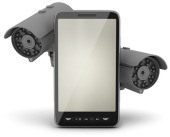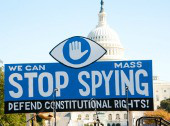Secretive US spy court once again OKs NSA phone record collection
 The secretive spy court that OKs the US National Security Agency’s (NSA’s) snooping has once again given the agency a thumbs-up to keep collecting phone records in the midst of recent, conflicting court decisions over whether it’s legal.
The secretive spy court that OKs the US National Security Agency’s (NSA’s) snooping has once again given the agency a thumbs-up to keep collecting phone records in the midst of recent, conflicting court decisions over whether it’s legal.
Shawn Turner, a spokesman for the Office of the Director of National Intelligence, said in a statement that the government filed an application with the Foreign Intelligence Surveillance Court (FISC) to keep collecting telephony metadata in bulk and that FISC had renewed the authority as of Friday.
This is all somewhat perfunctory: such requests have been required since the program started in 2006.
But this time, the request was rubber-stamped within the crossfire of court decisions about the legality of the NSA’s massive data collection program.
On 13 December, Judge Richard J. Leon of the District of Columbia ordered the intelligence agency to stop collecting data on two plaintiffs’ personal phone calls and to destroy their calling history records, saying the data collection was “almost Orwellian” and likely unconstitutional in its encroachments on US persons’ liberty as protected by the Fourth Amendment to the US Constitution.
Justice Leon was fully aware that the government would likely appeal his decision and hence stayed his order to grant it time to do so.
On Friday, the Department of Justice (DOJ) filed an appeal of Justice Leon’s decision on behalf of President Barack Obama, Attorney General Eric Holder and NSA Director General Keith Alexander in the US Court of Appeals for the District of Columbia Circuit.
The DOJ has defended the phone records program, arguing that FISC judges have approved the program on multiple occasions.
In fact, Turner said in the court’s statement, 15 FISC judges have approved the data collection on 36 separate occasions over the past seven years.
Justice Leon’s recent decision that the program is likely unconstitutional has been the lone dissenting voice.
In December, Judge William Pauley III of the US District Court for the Southern District of New York ruled on behalf of the NSA in a case filed by the American Civil Liberties Union (ACLU), finding that the intelligence agency’s phone records collection is legal.
 The ACLU appealed that decision last week.
The ACLU appealed that decision last week.
FISC said in its statement that it’s still “open to modifications” that would improve privacy and civil liberty protections “while still maintaining operational benefits.”
To that end, Turner said in the statement, they’re looking over the recommendations of the President’s Review Group on Intelligence and Communications Technologies.
In mid-December, that group of presidential advisors released a 303-page report recommending that, among other things, the NSA’s massive data trawling carry on, but that the data be kept in private hands for “queries and data mining” only by court order.
In other words, the panel recommended, keep collecting the data, same as before, but put somebody else’s hands on the reins.
And so it seems – new year, same old, same old.
Images of Capitol Hill and monitoring phone courtesy of Shutterstock.
Article source: http://feedproxy.google.com/~r/nakedsecurity/~3/aq4ew7YfHrI/